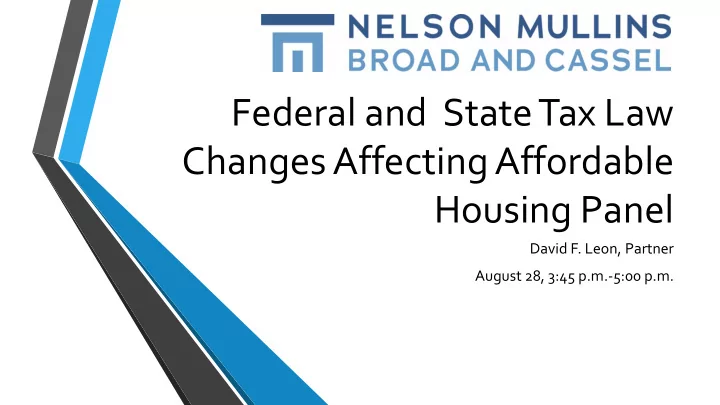

Federal and State Tax Law Changes Affecting Affordable Housing Panel David F. Leon, Partner August 28, 3:45 p.m.-5:00 p.m.
Changes from Tax Reform That Affect Affordable Housing • Tax Rates • Income Averaging Rules • Historic Tax Credit Delivery Schedule • New Depreciable Lives/ Bonus Depreciation • 50% Ad Valorem Property Tax Exemption • Qualified Business Income Deduction (Mike) • Opportunity Zones (Mike)
Tax Rates • Affected Credit Pricing • Affected Credit Pricing • Affected Credit Pricing • Anything else?
New Income Averaging Rules • Allows a developer to select a new unit mix and include persons earning up to 80% of area median income (AMI) • Must still qualify for Housing Credit units so long as the overall income of qualified tenants does not exceed 60% of AMI • This can be a great program to help alleviate work force housing issues • Can be used for tax-exempt bond transasctions, but still need to meet the minimum bond set-aside elections (i.e., 20 at 50 or 40 at 60).
Income Averaging -The Finer Details • IRS has published a new 8609 form to reflect income averaging option. • Designated income/rent levels may only be set at 10 percent increments beginning at 20% of AMI (20, 30, 40, etc.) • Income averaging applies to rent limits as well as income limits • Housing Credit developments that have already made a minimum set-aside election may not revoke them. Owners cannot switch from one set-aside system to income averaging.
Income Averaging - Open Questions • Unit desigination mechanics • Next available unit rule mechanics • Treat multi-building developments as a single property • Address compliance issues
Income Averaging - Policy Questions • How to address economic feasibility issues- Importance of market studies showing sufficient demand at each income targeting level – How many 60% units do we need? • How will HFAs incorporate this into their programs • Will State Agencies enact policies that curb the usefulness of this program – for example, can a Developer use this program to offset deeper skewing set-asides that were used to obtain other financing in order to support work-force housing?
Year 15 Property Tax Exemption 196.1978, part 2 • 50% Property Tax Exemption for certain affordable housing properties • Must be subject to a FHFC restrictive agreement for at least 15 years • Need to have at least 70 units occupied by tenants earning up to 80% of AMI • Need to apply annually for the exemption • Questions, and how: • Over income tenants and the next available unit rule • When does the 15 years start - EUA recorded much later than placed in service
Recommend
More recommend